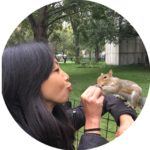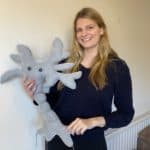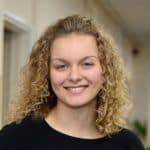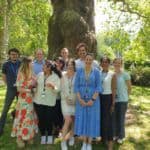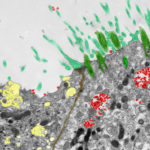Profile
Samuel Ellis
-
About Me:
I am from Norfolk originally, but now I live in North London with my fiancée. When I am not in the lab I enjoy history and relaxing on my Xbox, and most weekends I get muddy playing for a local amateur football club.
-
Read more
I am from a small rural village in Norfolk, but my family moved to Norwich during my teens and I ended up staying close by when I studied at the University of East Anglia.
I am a big animal lover and grew up with many pets, with a particular soft spot for dogs. Sadly renting a flat in London really limits pet options!
Beyond some obvious hobbies like gaming and Netflix, I really enjoy reading. I rarely ever do my commute on the London underground without a book to help pass the time. Although I have become a lot slower compared to my teen years, I still enthusiastically play football as much as I can. I currently play as a fullback for Alexandra Palace FC, a local amateur team with very muddy pitches in bad weather. I also play some Dungeons & Dragons with a group of friends and colleagues.
-
My pronouns are:
he/him/his
-
My Work:
My work involves looking at how viruses and bacteria might interact with human cells during infections. Since the pandemic I have been mainly studying coronavirus, including testing antibodies in saliva and the effectiveness of different antiviral drugs in the lab.
-
Read more
I was hired originally to work on a project looking at an interaction between RSV and the pneumococcus. RSV, Respiratory syncytial virus, is the leading viral cause of pneumonia (serious lung infections) in children, while the pneumococcus (Streptococcus pneumoniae is its full name) is a major cause of bacterial pneumonia. We were interested in whether these two microbes can stick together during infections, and if that might make them more dangerous for disease.
In recent years I have moved over to mostly COVID-19 studies, looking at various different aspects. One project involved measuring the antibody levels in saliva in people who had COVID early in the pandemic (lots of drooling into sample tubes!). I am a part of some big clinical trials investigating whether the virus is less infectious when patients are taking new therapies, as well as testing in the lab which antiviral drugs work best against SARS-CoV-2.
-
My Typical Day:
Hop on the tube to get to my lab building, next door to Great Ormond Street Children’s Hospital. Typical work might include defrosting some samples from our super cold freezers (-70 degrees Celsius) to run some tests, or I might be growing flasks of cells to be used as models for my infection experiments. Some of the busier days are when I use special higher containment labs, where I can safely work with live coronavirus and test if samples can infect human cells after different treatments.
-
Read more
One of the perks of working in research is that it is typically not a 9-5 job, you can be flexible with whatever work hours suit you and your experiments. As I am in no way a morning person that means I often get up a little late and have a leisurely breakfast before commuting to my institute. Of course the downside is that you often end up working evenings (or even weekends if needed) in order to get certain experiments finished!
My typical work is sometimes split between multiple locations. I am usually based at the Institute of Child Health, where my group has offices and a few different labs for bench-top experiments and growing cells for example. However, when I need to run an experiment involving live coronavirus, I sometimes have to use a containment level 3 lab at the Royal Free Hospital. As you can imagine this involves a lot more safety procedures which make sure that my colleagues and I can handle the virus without endangering ourselves or risk of it spreading. Before the pandemic, these CL3 labs were mostly being used by other researchers working on other higher-risk infectious diseases, such as tuberculosis or HIV.
As with many other jobs these days, at times it is possible to do some work from home. For example when writing research papers or performing data analysis, or joining online meetings. But there is obviously no way to do hands-on lab experiments remotely (as nice as that sounds some mornings..)
-
What I'd do with the prize money:
I might use the money to help expand the public engagement work on my institute’s dedicated YouTube channel (here), and also donate to STEM charities working with young people from disadvantaged backgrounds.
-
Education:
Flegg High School (2004-8), Thorpe St Andrew Sixth Form (2008-10), University of East Anglia (2010-18)
-
Qualifications:
11 GCSEs, 4 A-levels (Maths, Further Maths, Chemistry, Physics)
BSc in Biochemistry, MSc in Molecular Medicine, PhD in Microbiology
-
Work History:
Previously worked voluntarily in a charity shop for the British Heart Foundation, but was mostly a student before my current job
-
Current Job:
I am a post-doctoral researcher (basically a full-time lab scientist at a university)
-
Employer:
University College London
-
My Interview
-
How would you describe yourself in 3 words?
Microbiologist and amateur footballer
What did you want to be after you left school?
I thought about trying to become a medical doctor originally
Were you ever in trouble at school?
I used to get bored if I finished all the questions early and start chatting to my friends, it must have annoyed the teachers!
If you weren't doing this job, what would you choose instead?
I also love history, so working for a museum or in archaeology would be interesting
Who is your favourite singer or band?
I listen to random stuff, currently slightly addicted to a sea shanty group called The Longest Johns
What's your favourite food?
Anything with cheese on
If you had 3 wishes for yourself what would they be? - be honest!
To be better at multi-tasking, less easily distracted.. and longer weekends!
Tell us a joke.
I can’t stop reading this book about anti-gravity.. it’s really hard to put down
-


